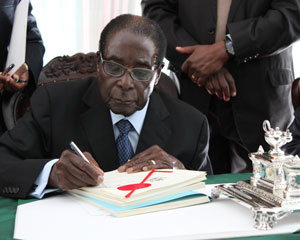
THE new Constitution, which was signed into law by President Robert Mugabe last week, creates a bloated government and numerous structures which the country’s weak economy can barely sustain, some analysts have said.
REPORT BY CAIPHAS CHIMHETE
But others were quick to point out that the new structures were a necessary expense if the country is to enjoy democracy and proper representation.
The new charter allocates 60 “affirmative action” seats for women for the first two terms, creates a Constitutional Court, a National Peace and Reconciliation Commission and a Gender Commission while people with disabilities are also officially represented in government.
It also creates a government structure at provincial level through devolution. Parliament, which is already seen as too big, consists of 210 members and the new constitution reserve an additional 60 seats for women.
It also does not have a ceiling on the number of Cabinet ministers that can be appointed by the President. The Constitutional Court, with nine judges, has already started work.
This new constitution comes into effect when the country is failing to feed its people, pay its foreign-stationed diplomats or service its international debts.
Critics say this lack of a ceiling could result in the appointment of more ministers by any winning party to reward loyal functionaries with posts.
- Chamisa under fire over US$120K donation
- Mavhunga puts DeMbare into Chibuku quarterfinals
- Pension funds bet on Cabora Bassa oilfields
- Councils defy govt fire tender directive
Keep Reading
The National Constitution Assembly (NCA) headed by Professor Lovemore Madhuku has been campaigning against the new constitution saying it created a bigger and unnecessary government.
“The size of Parliament has been increased to a total of 350 MPs (270 National Assembly and 80 Senators). The number increases to 355 MPs with five ministers appointed by the President,” said the NCA.
“We have no resources for such a huge legislature,” added the NCA.
‘DEMOCRACY IS COSTLY’
Crisis in Zimbabwe Coalition (CiZC) spokesperson Tabani Nyoni believes that all the commissions and structures created by the new Constitution were a necessary expense to manage a smooth political and economic transition.
He said some of the new creations were not permanent features, for example the provision for 60 seats reserved for women is only for 10 years after which it will fall out.
Nyoni said the National Peace and Reconciliation Commission was necessary to deal with past atrocities such as Gukurahundi massacres and issues of political violence, that have divided the nation.
“Democracy is an experiment and is costly. If you don’t pay using resources such as time and money, you may have to pay it through limps and blood,” said Nyoni.
“It is a fair comment that government could be bloated but it is not without a reason.”










